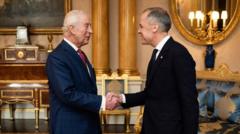Prime Minister Mark Carney's invitation to King Charles III marks a significant turning point in Canada's relationship with the monarchy, emphasizing sovereignty and independence as the nation contends with challenges posed by the U.S. administration under Donald Trump. This invitation, the first of its kind since 1977, highlights Canada's enduring ties to the British Crown and Carney's intent to reinforce national identity without surrendering to American pressures.
King Charles III's Upcoming Visit to Canada: A Sovereign Statement Against Trump

King Charles III's Upcoming Visit to Canada: A Sovereign Statement Against Trump
The invitation from Prime Minister Mark Carney for King Charles III to open Canada's Parliament signals a shift in the nation's ties with the monarchy amid rising tensions with the U.S.
In a historical transition, Canada's relationship with the British monarchy has fluctuated over the years, owing to shifting political climates and cultural influences within the country. In 2011, Prime Minister Stephen Harper sparked controversy by emphasizing ties to the monarch, only for subsequent Prime Minister Justin Trudeau to focus on distancing Canada from its colonial past. Carney's invitation to the King is positioned as a powerful message, asserting Canadian uniqueness in the face of perceived threats to its sovereignty.
The invitation comes during a politically charged time when Trump’s administration has often questioned Canada's independence and encouraged stateside comparisons. The impending royal visit is seen as a theatrical affirmation of Canada’s distinct identity, according to royal historian Justin Vovk. It serves to strengthen relationships within the British monarchy while also alluding to Canada’s search for stronger European partnerships.
King Charles III's acknowledgment of his Canadian subjects takes on new significance. As he prepares for his first state address to Parliament, the occasion carries the weight of Canada’s contemporary challenges, including lingering debates over the role of the monarchy and growing movements within Quebec to sever ties altogether. The King's visit, although short, is expected to resonate significantly, bridging a historical and political gap that reflects Canada’s journey from colonial ties to a modern, independent nation.
As the event draws closer, it remains to be seen how the monarchy's presence will influence Canadian sentiment towards its ties with Britain and the future of its relationship with the U.S.
The invitation comes during a politically charged time when Trump’s administration has often questioned Canada's independence and encouraged stateside comparisons. The impending royal visit is seen as a theatrical affirmation of Canada’s distinct identity, according to royal historian Justin Vovk. It serves to strengthen relationships within the British monarchy while also alluding to Canada’s search for stronger European partnerships.
King Charles III's acknowledgment of his Canadian subjects takes on new significance. As he prepares for his first state address to Parliament, the occasion carries the weight of Canada’s contemporary challenges, including lingering debates over the role of the monarchy and growing movements within Quebec to sever ties altogether. The King's visit, although short, is expected to resonate significantly, bridging a historical and political gap that reflects Canada’s journey from colonial ties to a modern, independent nation.
As the event draws closer, it remains to be seen how the monarchy's presence will influence Canadian sentiment towards its ties with Britain and the future of its relationship with the U.S.




















